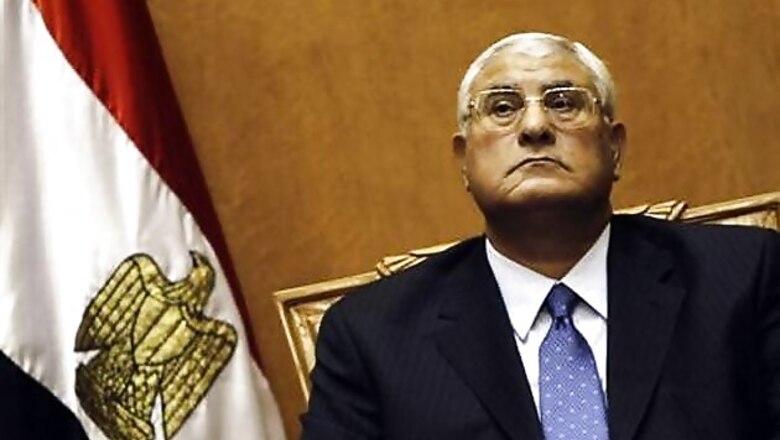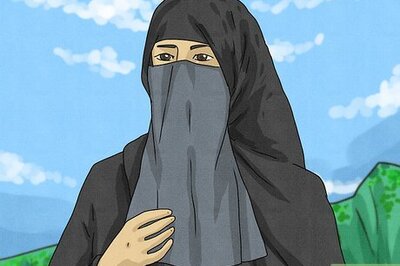
views
Egypt's prosecutor ordered the arrest of the Muslim Brotherhood's leader on Thursday, widening a crackdown against the Islamist movement after the army ousted the country's first democratically elected president.
But Egypt's new interim leader, Adli Mansour, used his inauguration to hold out an olive branch to the Brotherhood.
"The Muslim Brotherhood are part of this people and are invited to participate in building the nation as nobody will be excluded, and if they respond to the invitation, they will be welcomed," he said.
Calm returned to Cairo on Thursday after huge crowds had filled Tahrir Square, danced in the streets and held Egyptian flags aloft overnight to celebrate President Mohamed Morsi's downfall after days of mass protests.
Morsi's dramatic removal after a year in office marked another twist in the turmoil that has gripped the Arab world's most populous country in the two years since the fall of Hosni Mubarak.
The United Nations, the United States and other world powers did not condemn Morsi's removal as a military coup. To do so might trigger sanctions.
Army intervention was backed by millions of Egyptians, including liberal leaders and religious figures who expect new elections under a revised set of rules.
POLITICAL ISLAM
The fall of the first elected leader to emerge from the Arab Spring revolutions raised questions about the future of political Islam, which only lately seemed triumphant. Deeply divided, Egypt's 84 million people find themselves again a focus of concern in a region traumatised by the civil war in Syria.
Straddling the Suez Canal and Israel's biggest neighbour, Egypt's stability is important for many powers.
At least 14 people were killed and hundreds wounded in street clashes across Egypt on Wednesday, and television stations sympathetic to Morsi were taken off air. Morsi himself is in military custody, army and Brotherhood sources say.
The prosecutor's office also ordered the arrest of the Brotherhood's top leader, Mohamed Badie, and his deputy Khairat el-Shater, according to judicial and army sources.
The two men have been charged with inciting violence against protesters outside the Brotherhood's headquarters in Cairo that was attacked on Saturday night.
A senior Brotherhood politician, Essam El-Erian, said the movement would take a long view of the political setback.
Writing on Facebook, he said "waves of sympathy" for the Brotherhood would rise gradually over time and that the country's Islamist leaders were overthrown before they had a chance to succeed.
"The end of the coup will end faster than you imagine," he added.
Outside the constitutional court where Mansour was sworn in, 25-year-old engineer Maysar El-Tawtansy summed up the mood among those who had voted for Morsi in the 2012 poll and opposed military intervention.
"IT'S ABOUT EGYPT"
"We queued for hours at the election, and now our votes are void," he said. "It's not about the Brotherhood, it's about Egypt. We've gone back 30, 60 years. Now the military rules again. But freedom will prevail."
Army intervention was backed by millions of Egyptians, including liberal leaders and religious figures who expect new elections under a revised set of rules.
Underlining the military's central role in the overthrow of Morsi, the air force staged several fly pasts in the smoggy skies above central Cairo on Thursday to "celebrate the triumph of popular will".
But for the defeated Islamists, the clampdown revived memories of their sufferings under the old, military-backed regime led by Hosni Mubarak, himself toppled by a popular uprising in 2011.
The clock started ticking for Morsi when millions took to the streets on Sunday to demand he resign. They accused his Brotherhood of hijacking the revolution, entrenching its power and failing to revive the economy.
That gave armed forces chief General Abdel Fattah al-Sisi, who already had his own reservations about the state of the nation under Morsi, a justification to invoke the "will of the people" and demand the president share power or step aside.
The United States and other Western allies had also pressed Morsi hard to open his administration to a broader mix of ideas.
Sisi, in uniform and flanked by politicians, officers and clergy, called on Wednesday for measures to wipe clear a slate of messy democratic reforms enacted since Mubarak fell. The constitution was suspended.
INTERIM GOVERNMENT
A technocratic interim government will be formed, along with a panel for national reconciliation, and the constitution will be reviewed. Mansour said fresh parliamentary and presidential elections would be held, but he did not specify when.
Liberal chief negotiator Mohamed ElBaradei, a former U.N. nuclear agency chief, said the plan would "continue the revolution" of 2011.
Many hope they can have more electoral success than last year, when the Brotherhood's organisation dominated the vote. But its own ability to fight back democratically may be limited by the arrests of its leaders.
US President Barack Obama, whose administration provides $1.3 billion a year to the Egyptian military, expressed concern about Morsi's removal and called for a swift return to a democratically elected civilian government. But he, too, stopped short of condemning a military move that could block US aid.
"During this uncertain period, we expect the military to ensure that the rights of all Egyptian men and women are protected, including the right to peaceful assembly, due process, and free and fair trials in civilian courts," he said.
Obama urged the new authorities to avoid arbitrary arrests and said US agencies would review whether the military action would trigger sanctions on aid. A senator involved in aid decisions said the UnitedState would cut off its financial support if the intervention was deemed a military coup.
Much may depend on a strict definition of "coup."
Concerns over human rights have clouded US relations with Cairo, but did not stop aid flowing to Mubarak, or to Morsi.
The European Union, the biggest civilian aid donor to its near neighbour, also called for a rapid return to the democratic process. Foreign policy chief Catherine Ashton said that should mean "free and fair presidential and parliamentary elections and the approval of a constitution".



















Comments
0 comment